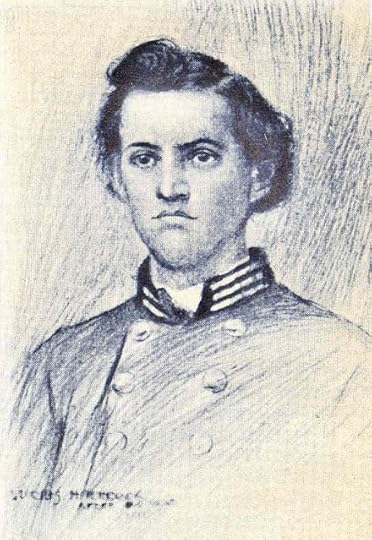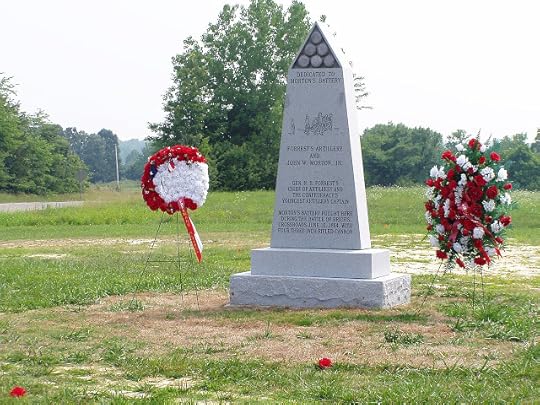With a Yell and a Charge: Captain Morton’s Artillery Charge at Brice’s Crossroads
Among themore extraordinary incidents of the Battle of Crossroads was the artillery chargeby Captain John W. Morton and his battery. The 21-year-old, General Nathan BedfordForrest’s chief of artillery, recalled the charge in a letter to his father afew days after the engagement.
“About 1 o’clock, everything,artillery and all, was ordered to charge,” he noted. “Our line moved promptly witha deafening shout and hail of bullets and balls which told terribly upon theenemy which broke their lines and put them in perfect confusion and rout. Icharged with the batteries nine times. Once I had two pieces alittle in advance of the others and with them in a charge was 20 or 30 yards inadvance of our line when we drove the enemy. Just before we captured theirwagons, they made a desperate stand and with their reserves concentrated,charged our right flank which gave way and fell back upon the two right piecesof my battery. The enemy moved up steadily, pouring a destructive fire into ourranks until they got within 50 yards of our two pieces. We changed projectiles,double charged the guns with canister, poured two volleys into their ranks andthis checked them. Three more volleys with the assistance of our lines formedon us and with a yell and a charge we drove them from the field.”
Captain Morton’s letter to his fatherin Atlanta, Georgia was shared with the editors of the Southern Confederacynewspaper who published it in its entirety in their July 5, 1864, issue.
 Captain John Watson Morton, a former student of General Bushrod Johnson, was captured at Fort Donelson in 1862 but joined Forrest's command after his exchange and quickly gained Forrest's trust as one of his most daring and accomplished subordinates. At Brice's Crossroads, Morton charged the retreating Federal forces with his guns as he recounts in the following letter.
Captain John Watson Morton, a former student of General Bushrod Johnson, was captured at Fort Donelson in 1862 but joined Forrest's command after his exchange and quickly gained Forrest's trust as one of his most daring and accomplished subordinates. At Brice's Crossroads, Morton charged the retreating Federal forces with his guns as he recounts in the following letter. Mississippi
June 1864
Dear father,
Kind heaven has again favored us witha glorious victory, a brilliant victory does not express it. General Forresthas achieved many brilliant victories but this far exceeds everything else hehas accomplished or anyone else in this war. We met the enemy at 10 o’clock onthe 10th, expecting only to skirmish with them until the train couldpass, wishing to draw them down to the prairies where we could get at thembetter as our force was quite small compared to theirs. We had in the fightfour brigades: Bell’s, Kentucky, Rucker’s, and Johnson’s brigade from Roddywith two batteries, Rice’s and mine, all numbering 4,500 men. Johnson had only800 men. The enemy’s force was variously estimated from 8,000-17,000 butgenerally believed by almost everyone at 10,000 men with 20 pieces ofartillery.
The fight raged furiously for threehours, the enemy evincing much stubbornness. About 1 o’clock, everything,artillery and all, was ordered to charge. Our line moved promptly with adeafening shout and hail of bullets and balls which told terribly upon theenemy which broke their lines and put them in perfect confusion and rout. Theymade eight determined stands but the promptness and rapidity of our movementscompletely baffled their expectations and drove them from the field afterfighting half or one hour. We were so rapid in our charges with artillery thattheir batteries did them no good after the first fight. They attempted to takepositions but were routed before they could fire more than two or three shots.
 Morton's Battery monument on the Brice's Crossroads battlefield.
Morton's Battery monument on the Brice's Crossroads battlefield. I charged with the batteries ninetimes. Once I had two pieces a little in advance of the others and with them ina charge was 20 or 30 yards in advance of our line when we drove the enemy.Just before we captured their wagons, they made a desperate stand and with theirreserves concentrated, charged our right flank which gave way and fell backupon the two right pieces of my battery. The enemy moved up steadily, pouring adestructive fire into our ranks until they got within 50 yards of our twopieces. We changed projectiles, double charged the guns with canister, pouredtwo volleys into their ranks and this checked them. Three more volleys with theassistance of our lines formed on us and with a yell and a charge we drove themfrom the field.
We followed them 50 miles the nextday, skirmished with them, and drove them all the night succeeding, scatteringthem over the entire country. There will 100 in a squad ever arrive back atMemphis; they are still being picked up and brought in. It is not recorded inthe history of this war or any other where the infantry marched so rapidly andfar as they did- 120 miles in 14 hours.
We captured, 2,500 prisoners, 300 wagons and ambulancesloaded with ordnance, commissary, and medical stores, 16 pieces of artillery,13 caissons, and killed and wounded 1,500 men. A good many Negroes werecaptured but have a few of them prisoners. Our loss was 800 killed and wounded.I had one man killed and nine wounded in the artillery but only one of thewounded would consent to go to the hospital- all told me they would remain withtheir guns as long as they could ride or walk. I never saw such a determinedspirit in my life as everyone exhibited. Forrest’s cavalry can’t be whipped.
The general [Forrest] had paid the artillery some highcompliments and says he never saw artillery handled better in his life and thathe is indebted to for the victory. Without us, he could not have accomplishedanything but would have been ruined. He says that he is particularly proud ofmy battery; they are the best men he has and if he had had three such batterieshe could have whipped them without any other assistance. All the battery boyshave immortalized themselves. None of our Nashville boys were hurt.
Source:
Letter fromCaptain John Watson Morton, Morton’s Tennessee Battery, Atlanta SouthernConfederacy (Georgia), July 5, 1864, pg. 2
Daniel A. Masters's Blog
- Daniel A. Masters's profile
- 1 follower



